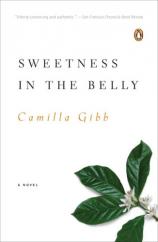Reading Group Guide
Discussion Questions
Sweetness in the Belly

1. Discuss Lilly’s role as an outsider and her struggle for acceptance both as a farenji in Harar and as a white Muslim in London. Who else in the novel could be considered an outsider?
2. What do the words “family” and “home” mean to Lilly? How does her view of herself as an orphan evolve over the course of the novel?
3. “Faith has accompanied me over time and geography and upheaval,” says Lilly. For her, love and Islam “have always been one.” Did Sweetness in the Belly in any way alter or broaden your understanding of Islam? Consider, for instance, the notion of jihad or holy war.
4. Sweetness in the Belly alternates between Harar, Ethiopia, in the 70s, and London, England, in the 80s and early 90s. What qualities does this crosscutting of time and place impart to the narrative?
5. In the chapter entitled “Exile,” Lilly observes that “the smell of coffee draws women together, an olfactory call throughout a neighbourhood luring women from their homes to gather…” Later in the chapter, the act of twisting a mortar over coffee beans and cardamom triggers in her a surge of nightmarish images from the Red Terror. Of the many lush sensory details in the novel – both fair and foul – which affected you the most?
6. While living in Ethiopia, Camilla Gibb witnessed a female circumcision. A doctoral student in social anthropology at the time, she says she had to “understand it in the context of the community in which it was taking place, and not judge.” When Nouria’s daughters are circumcised in Sweetness in the Belly, how does Lilly react as the only Western-born character in the scene? How did you react as a reader?
7. Based on your reading of Sweetness in the Belly, what feelings and psychological states are associated with the experience of exile? How do Amina and Yusuf, for example, cope with their respective traumas?
8. In Harar, Aziz is called a “black savage, African slave, barbarian, pagan.” In London, Lilly is called a “white fu’in Paki.” Discuss the notion of “otherness” in the novel. How do artificial divisions manifest themselves based on ethnicity, class, race, religion and gender?
9. Discuss the ways in which the female characters ensure their survival and empower themselves despite the gender divisions within their communities.
10. What does Lilly mean when she says that Aziz “unveiled” her? How does she reconcile her love for him with her love of Islam?
Sweetness in the Belly
- Publication Date: March 27, 2007
- Paperback: 368 pages
- Publisher: Penguin (Non-Classics)
- ISBN-10: 0143038729
- ISBN-13: 9780143038726







